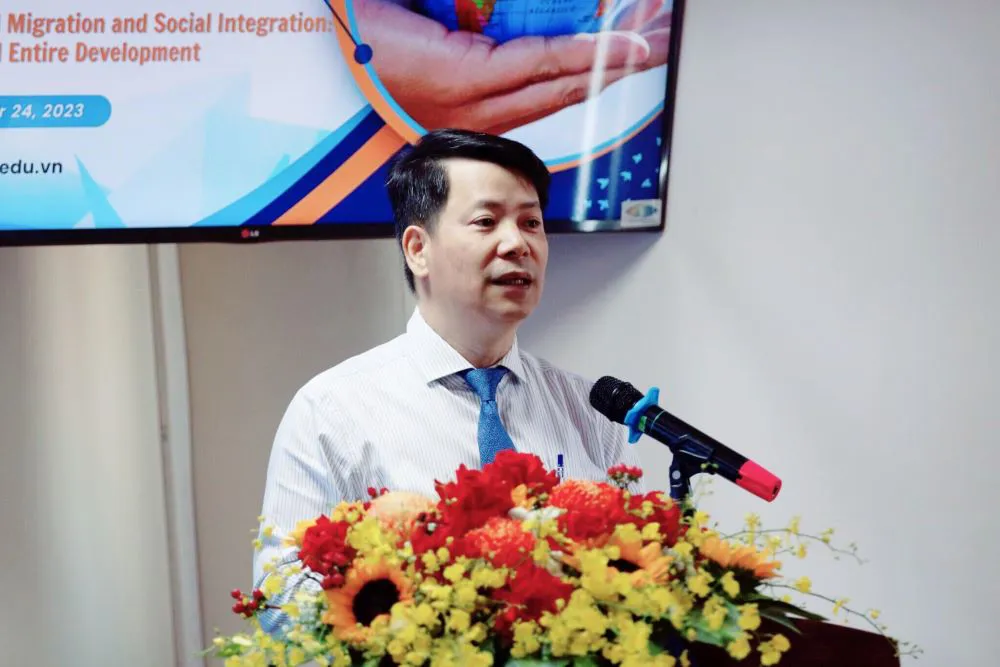The need for international action on migration
While migration promotes economic growth and cross-cultural understanding in the new communities, it also has detrimental effects on society.
Migration significantly contributes to the labor force and economy. But it also has a negative impact on society, requring international efforts in magaging and promoting its strengths.
| Speakers from Chonnam National University, South Korea, at the conferene held in Hanoi on Oct 24. Photos: Vietnam Women's Academy |
The view was shared at the “International Migration and Social Integration: Inclusion and Entire Development” held in Hanoi on October 24 by Vietnam Women’s Academy and Chonnam National University, South Korea.
Given international connection and impact in migration, the conference gathered nearly 40 presentations, focusing on four main issues: Migration and Gender Issues; Migration and Health Care; Migration and Social Protection; Other Migration-related Issues contributed by experts from regional countries namely China, South Korea, and Thailand and organizations, such as IOM, UN Women, Action Aid, Care, Oxfam, and ADB.
The conference is aimed at exchanging scientific research findings and providing a forum for academic discussion on topics pertaining to change, adaptation, international migration, and social integration that are occurring in numerous nations worldwide, such as Vietnam, South Korea, Thailand, and China.
As a result, they offer ways to mitigate migration's negative effects and improve immigrants' capacity for social and cultural integration, all of which advance gender equality and sustainable development.
| Associate Prof. Tran Quang Tien, Director of the Vietnam Women’s Academy, speaks at the event. |
Associate Prof. Tran Quang Tien, Director of the Vietnam Women’s Academy, said migration is an important development trend in the 21st century, a necessary component of development. International exchanges, technology transfer, filling labor shortages, and social and economic development have all benefited greatly from migration.
Migration contributes to cultural and social diversity by bringing values, beliefs, and cultural traits to new places, thereby enriching and diversifying society. It contributes significantly to the economy and the workforce as it can help nations with a shortage of human resources by bringing in cheap, skilled labor, which boosts economic growth.
Multinational or multiethnic family models are created when people migrate and have the chance to reconnect with friends and family in the new country.
Migration has a significant impact on household income. Engaging in labor migration enables migrants to encounter differences in lifestyle and culture, facilitating adjustments to new living conditions and occupations in the destination country.
He stressed the role of women in migration, saying that the shift in gender roles within the family is also influenced by migration. The economy and family income are growing as a result of the significant contributions of migrant women.
The status, voice, and decision-making authority of women in the family have undergone numerous changes. Relationships between family members are also improved by the shift in the division of labor within the family.
Statistics from the International Organization for Migration (IOM) showed that the number of international migrants worldwide was 281 million in 2020, accounting for 3.6% of the global population. Europe and Asia have the largest number of international migrants. Global remittances reached US$711 billion. Over the previous fifty years, there has been an increase in the estimated number of international migrants triggered by climate change, socio-political and economic issues.
| Participants at the conference. |
Challenges
However, migration also has negative impacts on society, such as increased demand on the environment and resources in receiving areas, which results in resource competition and environmental damage.
Additionally, it leads to labor competition issues, social unrest and political disputes, and lowers domestic income, particularly when domestic workers feel intimidated or face competition from immigrants.
International relations and international cooperation between countries can be impacted by migration, which can put pressure on the social security and financial systems of destination countries, particularly when migrants require social or medical support. It poses problems for global politics and security.
The complex impact of migration on society requires political, economic, and social solutions in order to ensure integration and safeguard human rights.
Much of the content is useful, such as the integration of female migrant workers who have been repatriated to Vietnam and a comparison of the social security rights of foreign and domestic workers in Vietnam where artificial intelligence is used to manage migration.
Experts can share findings from scientific research at the conference and talk about topics including change, adaptation, and international migration. Many nations worldwide, including China, Vietnam, Korea, and Thailand, have become economically and socially integrated.
Thus, they put forth ways to mitigate the adverse effects of migration, improving migrants' adaptation during the integration process, and fostering social insertion—all of which advance gender equality and sustainable development.












